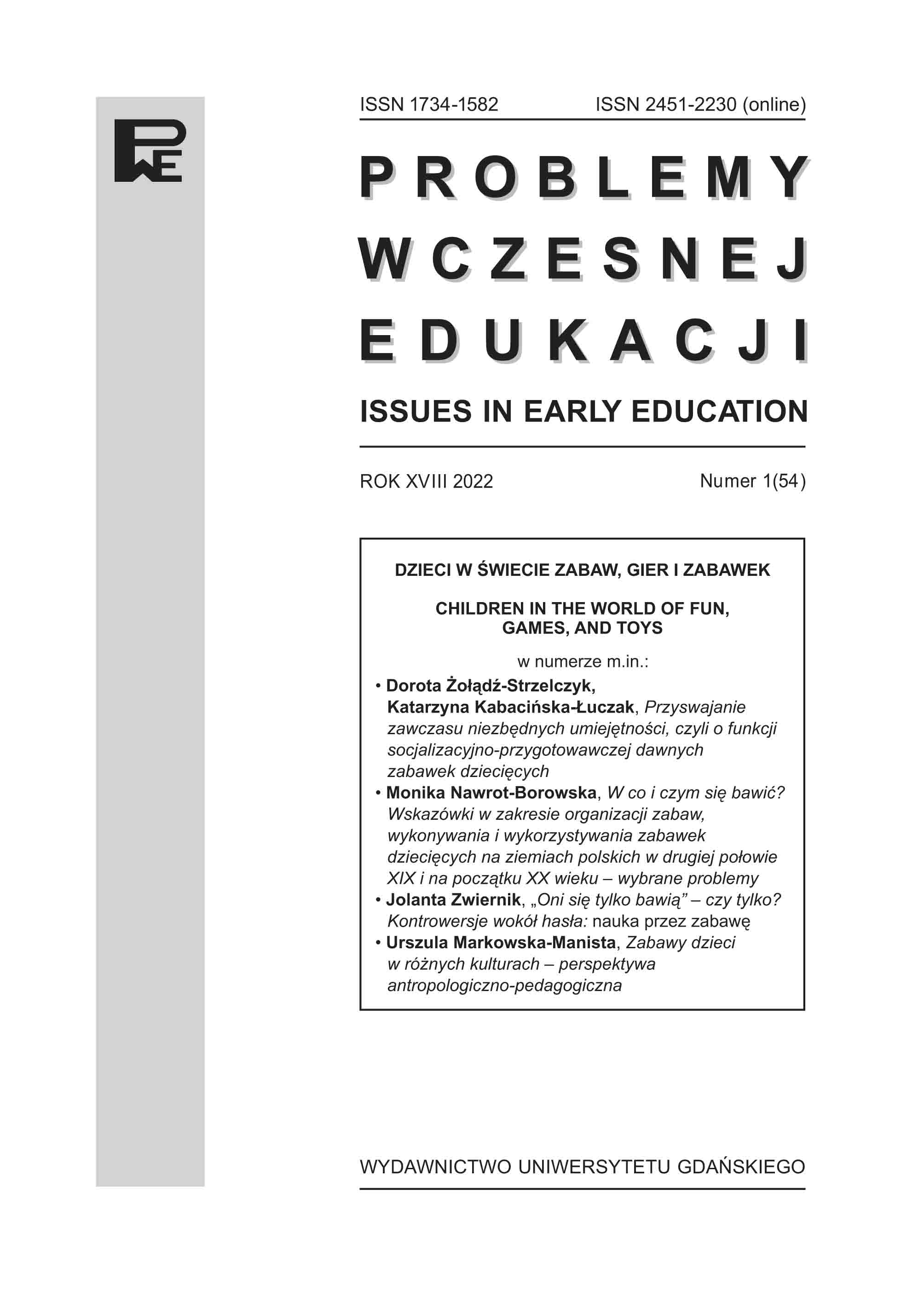Pomiędzy zabaw(k)ą a materiałem i pracą w praktyce pedagogii Montessori
DOI:
https://doi.org/10.26881/pwe.2022.54.08Słowa kluczowe:
Montessori, praca, zabawa, wczesna edukacjaAbstrakt
The article presents the results of qualitative research conducted among thirty-one Montessori 3–6 guides from Polish kindergartens. The main scope of the text is to outline the conceptions of play and work and the ways in which they are intertwined. The outcome space consists of four categories: 1. play as ethical and organizational challenge; 2. play as the obstacle in children’s development; 3. play as activity with no value; 4. play as work/work as play. The first category is framed by the rationality of play being important for the teachers and thus creating a dilemma whether to follow the child and let them play or to follow the Montessori curriculum and focus on free work? The second and the third categories are related with play being insignificant or negative for the development. The last category is the mode of thinking in which one cannot tell play and work apart. From this perspective both play and work are essential for the development of the child and the border between these two forms of activities is blurry. The last category initiates and invites to discuss and perhaps redefine the very concept of work in Montessori prepared environment.
Downloads
Bibliografia
Agamben G. (2006), Profanacje. Warszawa, PIW.
Aljabreen H. (2020), Montessori, Waldorf, and Reggio Emilia: A Comparative Analysis of Alternative Models of Early Childhood Education. „International Journal of Early Childhood”, 3(52).
Arendt H. (2010), Kondycja ludzka. Warszawa, Aletheia.
Carter M.A. (2016), Work ‘with’ me: Learning prosocial behaviours. „Australian Journal of Early Childhood”, 4(41).
Chou M-J (2017), Board Games Play Matters: A Rethinking on Children’s Aesthetic Experience and Interpersonal Understanding. „Eurasia Journal of Mathematics Science and Technology”, 6(13).
Cossentino J. (2005), Ritualizing expertise: A non-Montessorian view of the Montessori method. „American Journal of Education”, 2(111).
Cossentino J. (2006), Big Work: Goodness, vocation, and engagement in the Montessori method. „Curriculum Inquiry”, 1(36).
Denzin N., Lincoln Y.S. (2009), Wprowadzenie. Dziedzina i praktyka badań jakościowych. W: N.K. Denzin, Y.S. Lincoln(red.), Metody badań jakościowych. Warszawa, PWN.
Foucault M. (2020), Nadzorować i karać. Narodziny więzienia. Warszawa, Wydawnictwo Aletheia.
Hyde B. (2011), Montessori and Jerome W. Berryman: work, play, religious education and the art of using the Christian language system. „British Journal of Religious Education”, 3(33).
Klus-Stańska D. (2012), Konstruowanie wiedzy w szkole. Olsztyn, Wydawnictwo Uniwersytetu Warmińsko-Mazurskiego.
Klus-Stańska D., Nowicka M. (2013), Sensy i bezsensy edukacji wczesnoszkolnej. Gdańsk, Harmonia.
Kramer R. (1976), Maria Montessori. A Biography. New York, G.P. Putnam and Sons.
Kvale S. (2004), Interview – wprowadzenie do jakościowego wywiadu badawczego. Białystok, Wy-dawnictwo Trans Humana.
Lewartowska-Zychowicz M. (2010), Homo Liberalis jako projekt edukacyjny. Od emancypacji do funkcjonalności. Kraków, Oficyna Wydawnicza „Impuls”.
Lillard A.S. (2012), Preschool children’s development in classic Montessori, supplemented Montes-sori, and conventional programs. „Journal of School Psychology”, 50(3).
Lillard A.S. (2013), Playful learning and Montessori Education. „NAMTA Journal”, 2(38).
Lino D.M., Parente C. (2018), Play and learning in early childhood education: The contribution of High Scope, Reggio Emilia, and Montessori Pedagogical approaches. W: C.A. Huertas-Abril, Early childhood education from an intercultural and bilingual perspective. Hershey, IGI Global.
Marton F. (1988), Phenomenography: exploring different conceptions of reality. W: D. Fetterman (ed.), Qualitative Approaches to Evaluation in Education. New York, Praeger.
Marton F.(1994), Phenomenography. W: T. Husen, T.N. Postlethwaite (eds.), The International Encyclopedia of Education. Oxford–New York, Pergamon, Elsevier Science.
Miksza M. (2010), Zrozumieć Montessori. Czyli Maria Montessori o wychowaniu dziecka. Kraków, Oficyna Wydawnicza „Impuls”.
Moll I. (2004), Towards a constructivist Montessori education.„Perspectives in Education”, 2(22).
Montessori M. (1985), Kinder sind anders. Stuttgart, Klett-Cotta Verlag.
Montessori M. (2014), Education for a New World. Amsterdam, Montessori – Pierson Publishing Company.
Montessori M. (2018), Sekret dzieciństwa. Warszawa, Wydawnictwo Naukowe PWN.
Montessori M. Jr. (2017), Education for Human Development: Understanding Montessori. Amster-dam, Montessori – Pierson Publishing Company.
Padilla R.V. (1994), The unfolding matrix: A technique for qualitative data acquisition and analysis. W: R.G. Burgess (ed.), Studies in qualitative methodology. Greenwich, JAI Press.
Rogoff B., Sellers M.J., Pirrotta S., Fox N., White S.H. (1975), Age of Assignment of Roles and Re-sponsibilities to Children: A Cross-Cultural Survey. „Human Development”, 18.
Ultanir E. (2012), An Epistemological glance at the constructivist approach: Constructivist learning in Dewey, Piaget, and Montessori. „International Journal of Instruction”, 2(5).
Wimmer T. (1998), Wprowadzenie do pedagogiki zabawy. Doświadczenia osobiste. „Grupa i Za-bawa”, 2.
Woolsey K. (2008), Child’s play. „Theory into Practice”, 2(47).
Wygotski L.S. (2002), Wybrane prace psychologiczne, t. 2: Dzieciństwo i dorastanie. Poznań, Wy-dawnictwo Zysk i S-ka.
Zaorska Z. (1995), Tło teoretyczne pedagogiki zabawy. „Grupa i Zabawa”, 1.

 Uniwersyteckie Czasopisma Naukowe
Uniwersyteckie Czasopisma Naukowe





